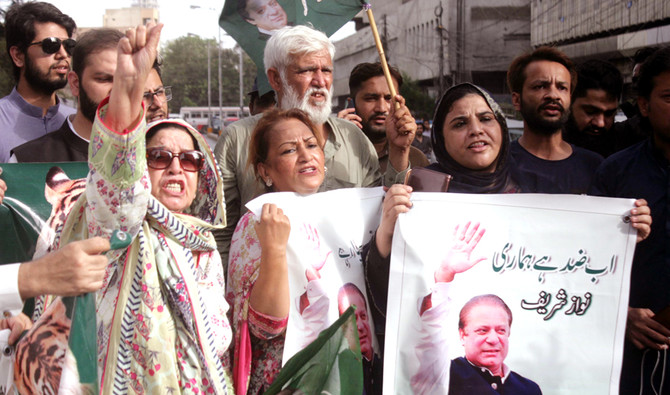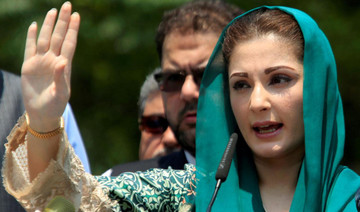ISLAMABAD: Pakistan’s anti-graft body has announced it will arrest ex-premier Nawaz Sharif and his daughter Maryam Nawaz at the airport as soon as they arrive in the country from London.
“NAB has received arrest warrants from the accountability court and started the process of the arrest of Nawaz Sharif, Maryam Nawaz and Capt. (retd) Mohammad Safdar as per the law in order to implement the judgment in letter and spirit,” the National Accountability Bureau (NAB) said in a statement on Saturday.
The bureau said it would again ask the Interior Ministry to place the names of the members of the Sharif family who have been sentenced by the accountability court, on the Exit Control List to stop them from leaving Pakistan.
Ousted Prime Minister Sharif was sentenced to 10 years in prison by an accountability court in the Avenfield properties reference on Friday, while his daughter Maryam and her husband Safdar were sentenced to seven years and one year respectively.
The court also ordered the forfeiture of their property in the Avenfield Apartments in London and imposed a £8 million ($10.5 million) fine on Sharif and £2 million on Maryam. The money will go into the state treasury.
Speaking to the media in London after the verdict was announced, Sharif said he would return to Pakistan to “face prison.” However, he gave no specific date to return to the country.
Sen. Mushahid Ullah Khan, secretary in Pakistan Muslim League-Nawaz (PML-N) party, said the accountability court had exonerated Sharif of corruption in its verdict.
“This is our victory. We are convinced that the conviction on the charge of having assets beyond known sources of income will be suspended by the High Court,” he told Arab News.
He said the punishment was awarded on the assumption that Sharif must have given money to his children to buy Avenfield Apartments.
“It is a weak verdict and even legal experts have rejected it,” he said.
Khan said that imprisonment for Sharif and his daughter was part of a malicious campaign against them by his political rivals.
“We have been facing this campaign since 2013 and will continue contest it through logic and support of the people,” he said.
Khan claimed the party’s vote bank is increasing across the country in the wake of Sharif’s trial in “bogus cases.”
“Mark my words, the PML-N is going to sweep the general elections despite all the high-handedness against the party,” he said. “People are with Nawaz Sharif and they will give their verdict in his favor on July 25.”
Some legal experts believe the NAB has “failed” to provide solid evidence of corruption or any corrupt practice on Sharif’s part in the accountability court during the trial.
“The judgment is based on unproven facts,” Supreme Court advocate Sharafat Ali told Arab News.
Ali said the Sharifs could file an appeal against the verdict in Islamabad High Court in the next 10 days.
“It will be easy for Sharif’s lawyers now to just focus on the charge of assets beyond means and tear it down in the High Court through solid arguments,” he said.
The NAB filed three separate references against the Sharif family in September last year regarding the high-end properties in London on the Supreme Court’s directives in the Panamagate verdict that disqualified Nawaz Sharif as prime minister in July last year. The court has given a verdict in only one reference, Avenfield Apartments, while the trial in the two other cases is yet to be completed.
Political analysts say rigorous punishment for Sharif and his daughter just weeks before the general elections will deal a severe blow to PML-N.
“The majority of voters in Punjab think after the judgment that Nawaz Sharif and his party enjoy no more blessings of the powers-to-be, so they may not vote for the PML-N,” Professor Tahir Malik, political analyst and academic, told Arab News.
He said the perception of a political party matters a lot in Pakistani politics, especially before the general elections. “Now the perception is that Nawaz Sharif’s party is going to lose the upcoming general election,” he said.
Malik said it would be nothing less than a miracle if Nawaz Sharif and his other party leaders succeed in turning the tide in their favor before the July 25 polls.
“Nawaz Sharif’s party may not win the majority of seats but it can still emerge as a formidable force in the elections, if the leadership succeeds in selling its narrative ‘give respect to vote’ to the people,” he added.































